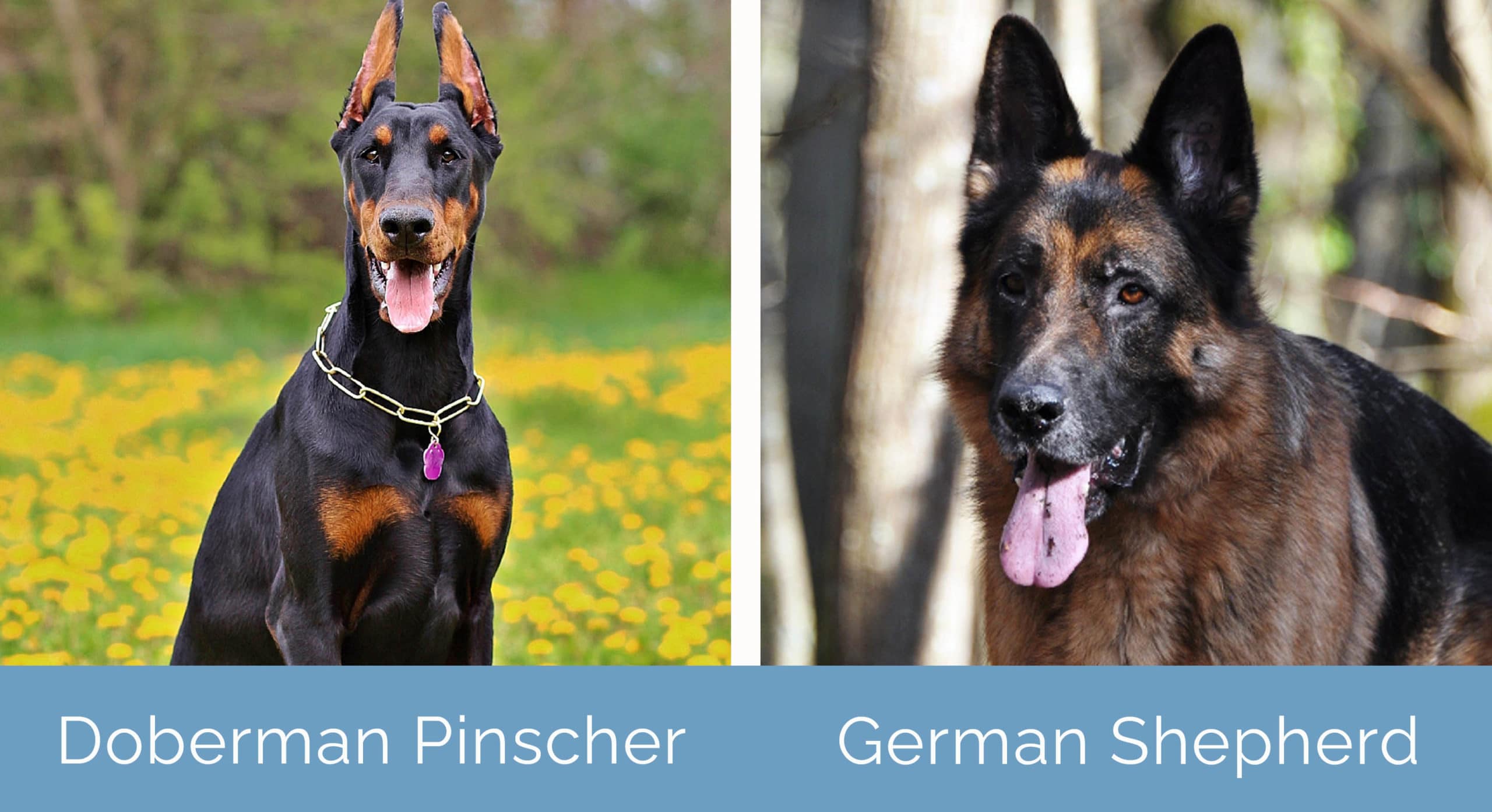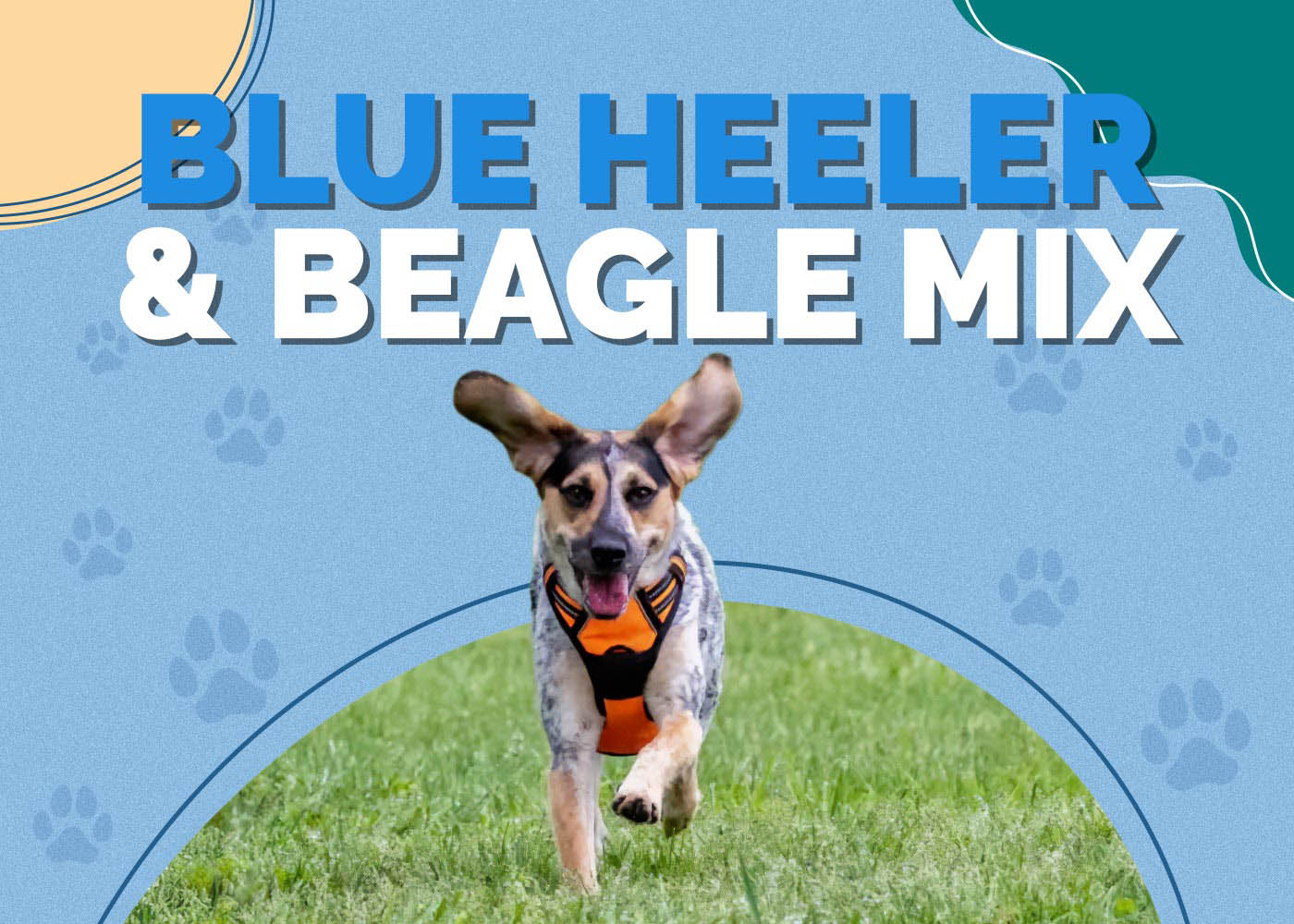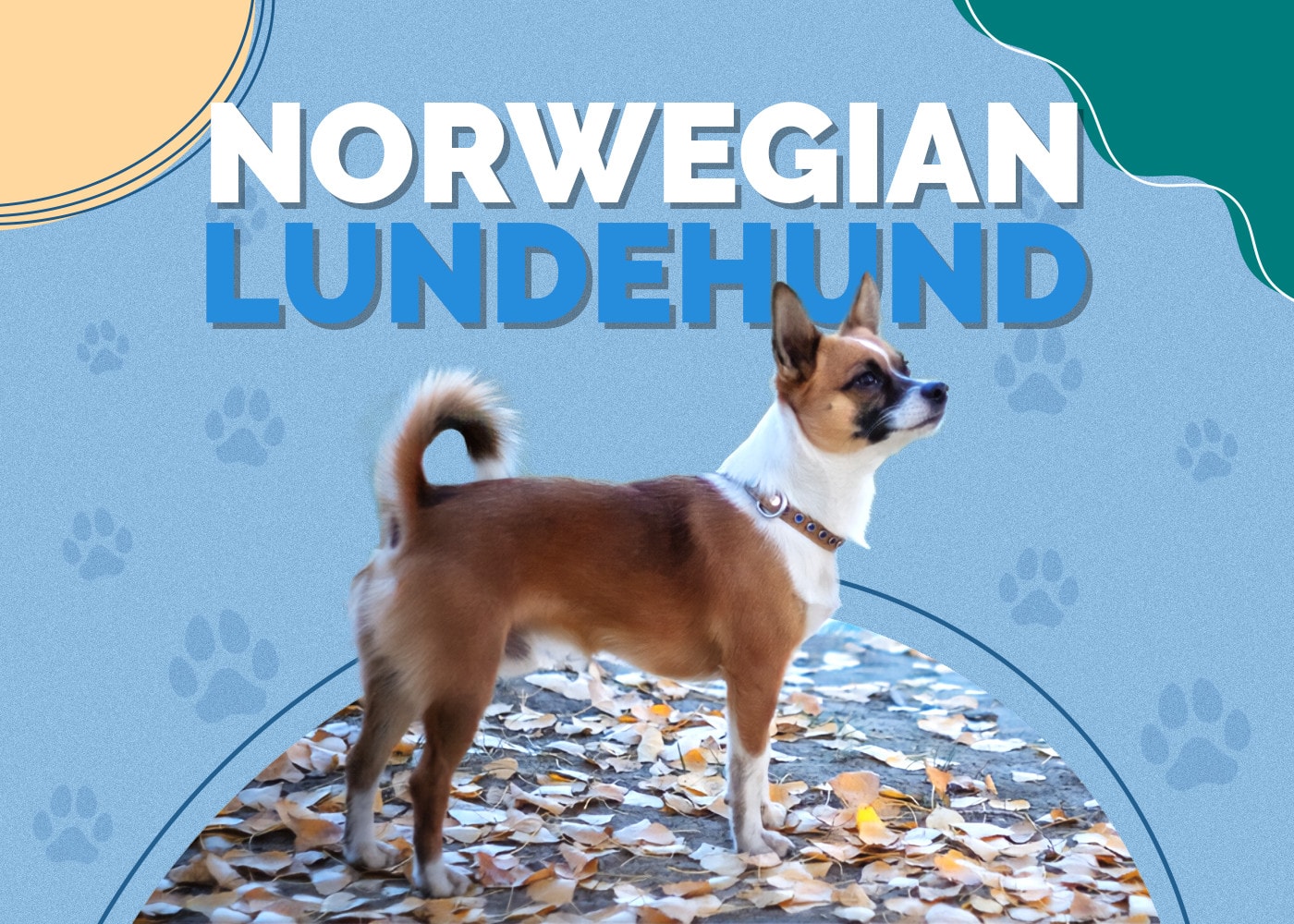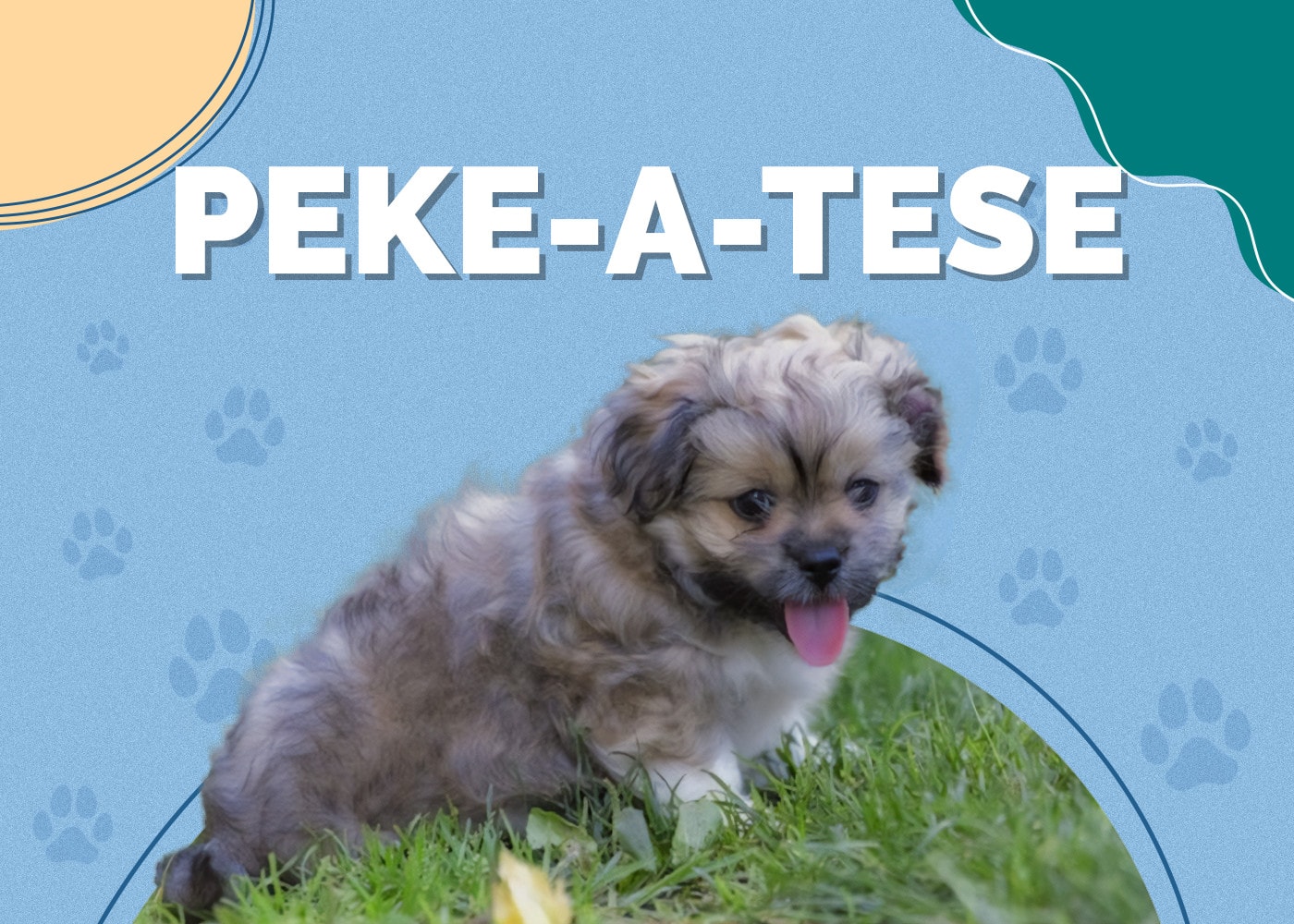Doberman Pinscher vs. German Shepherd: Which Dog to Choose?
Updated on

Doberman Pinschers and German Shepherds are two of the most popular dog breeds in the world, and for good reason. They make wonderful pets and even better guard dogs. Both breeds are medium to large in size, and both are easy to train, with the ability to turn ferocious if need be. There are also German Shepherds mixed with Dobermans, but that’s a different topic.
Despite their fearsome reputations, both dogs are great with families. If you’re thinking about bringing one of these pups into your home, the guide below will help you determine which would be a better fit for your family.
Visual Differences
A Quick Overview
- Average Height (adult): 24-28 inches
- Average Weight (adult): 70-100 pounds
- Lifespan: 10-13 years
- Exercise: High; at least 2 hours per day
- Grooming Needs: Minimal
- Family-friendly: Yes, provided that they’re well-trained and socialized
- Dog-friendly: Yes, if they’re properly socialized; they can be aggressive otherwise
- Trainability: High; this breed is very intelligent
- Average Height (adult): 22-26 inches
- Average Weight (adult): 50-90 pounds
- Lifespan: 9-13 years
- Exercise: High; at least 2 hours per day
- Grooming Needs: Medium
- Family-friendly: Yes, provided that they’re well-trained and socialized
- Dog-friendly: Often friendly toward dogs that they were raised with, but suspicious of strangers
- Trainability: High; this is one of the smartest breeds on the planet
Doberman Pinscher Overview
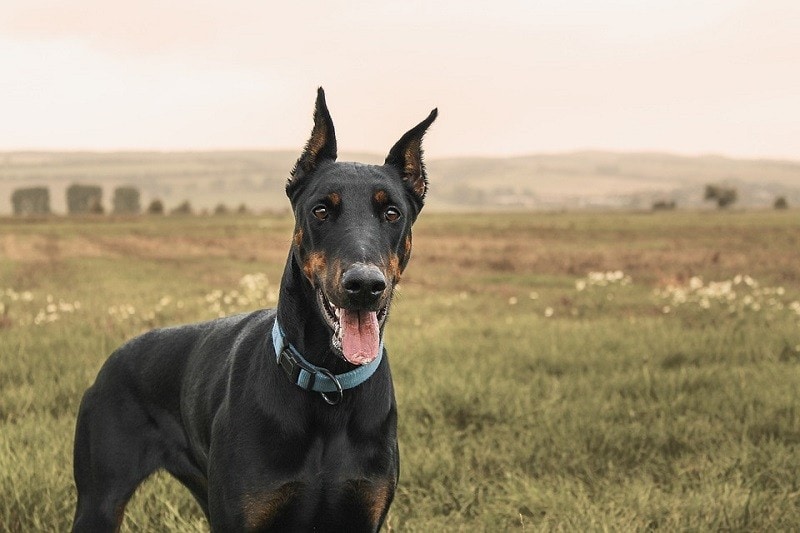
Doberman Pinschers were developed in the late 19th century by Karl Dobermann, a German tax collector who understandably feared for his safety. His plan was to create the perfect guard dog: one that was loyal and loving toward their master but absolutely fearless when it came to protecting that master.
As a result, the dog needed to be a good size and have impressive strength, endless stamina, and formidable intelligence. The Doberman delivered on all counts, and they remain both a loving pet and an intimidating guard dog today.
These dogs don’t come cheap, however. Getting a purebred puppy from a reputable dealer can cost anywhere from $1,500 to $2,500, depending on the quality of the bloodline. Those prices can rise even higher if you want the dog delivered to you fully trained.
Doberman Pinscher Personality
Dobermans are fierce-looking dogs. They resemble a tooth-filled missile covered in hair, and there are few things as terrifying as having that missile launched in your general direction.
They’re rarely aggressive, though, especially when trained and socialized properly. However, they are business-like in their general demeanor, and they are capable of laser-like focus on any given task.
Despite that, they’re also fun-loving and goofy animals that can get along with adults and children equally well. They’re generally good at tailoring their level of play to their partner, so they can romp around and roughhouse with your teenager before playing softly and gently with your toddler.
They’re also affectionate and often consider themselves lap dogs. Don’t be surprised if your Doberman is constantly hounding you for attention, as they enjoy a good belly rub or scratch behind the ears more than most.
Be careful to ensure that every member of your family spends time with the dog, however, as Dobermans sometimes bond strongly with just a single person. This can cause them to become extremely protective of them or lead to the dogs ignoring commands issued by anyone else.
Training for Doberman Pinschers
Dobermans live to serve. They’re ready to learn a new trick or task at a moment’s notice, and they can pick up most commands with ease.
You have to earn their respect before they’ll listen to you, though. These dogs are extremely observant, and they’re constantly sizing people up and scanning for weaknesses. If you let them walk all over you, they’ll do just that, but they’ll go to the ends of the Earth for an owner that they respect.
Don’t mistake “earning their respect” with abusing them, however. These dogs don’t respond well to mistreatment, as it’s likely to make them misbehave and become even more disobedient. Instead, use positive reinforcement and a loving-but-firm command style.
They need to be extremely responsive to your instruction and well-socialized, as the breed can be prone to aggression otherwise. If you take the time to introduce them to new people, places, and things in a controlled manner, they should be accepting of just about anyone, including dogs and other pets.
These pups are sensitive to their environments, so if you have a stressful home life, they may not be the right breed for you. Not only will they pick up on (and possibly react to) any hostility in the air, but stress can also cause them to develop digestive issues and other illnesses.
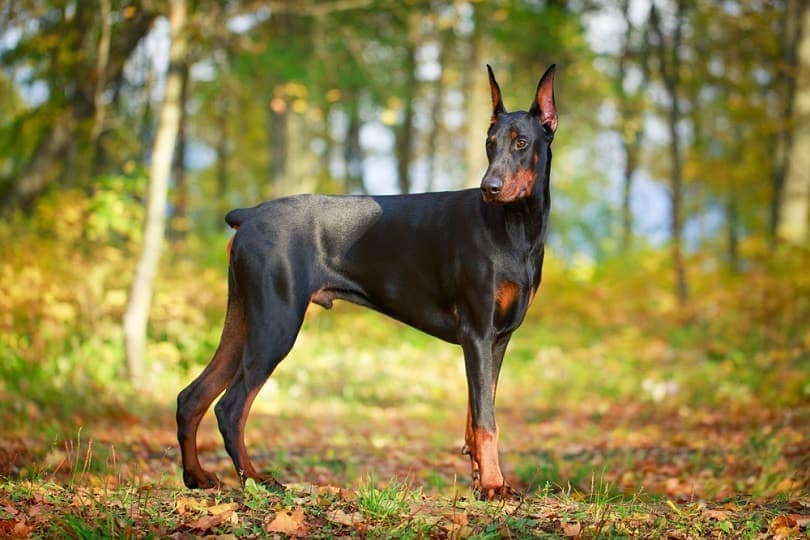
Doberman Pinscher Health and Care
Dobermans should be lithe and lean, so be careful not to overfeed your dog. They need a high-protein kibble that will sustain them through an active day, and you should be strict about portion controls. They should not be allowed to free-feed.
These dogs have boundless energy, and as such, they require quite a bit of physical and mental stimulation. Aim for at least 2 hours per day of vigorous exercise or training, as this will keep them tuckered out and less likely to use excess energy for destructive purposes.
They’re great dogs if you’re hoping to compete in agility training, obedience trials, or similar canine sports. Their natural athleticism and impressive intelligence allow them to excel at just about anything that you ask of them.
As far as grooming is concerned, these are low-maintenance dogs. They have a short coat that sheds minimally, so you only need to brush them once a week or so. They only need to be bathed when visibly dirty. Brush their teeth daily, trim their nails as needed, and clean their ears out once a week or so.
The breed is predisposed toward heart disease and certain cancers, and these conditions can cut their lifespans considerably. Obesity is another huge problem for the breed, but as long as you feed them responsibly and exercise them regularly, it shouldn’t be much of an issue.
Doberman Pinschers Are Suitable For:
Dobermans are versatile dogs, and they can be equally perfect for a large family or a single owner. They’re also great working dogs, which is why they’re often used by the police, military, and private security firms.
The breed is intelligent and easy to train, but if you’re the wishy-washy type, they may walk all over you. They’ll follow a loving owner with a firm hand, but they may become overly attached to them as well.
Due to their boundless energy levels, Dobermans aren’t generally recommended for apartment dwellers or couch potatoes. These dogs need room to run and an owner who’s willing to let them do just that.
Also, they can be prone to a variety of serious medical conditions, so they’re a poor choice for anyone who’s not willing to invest heavily in their dog’s health.
German Shepherd Overview
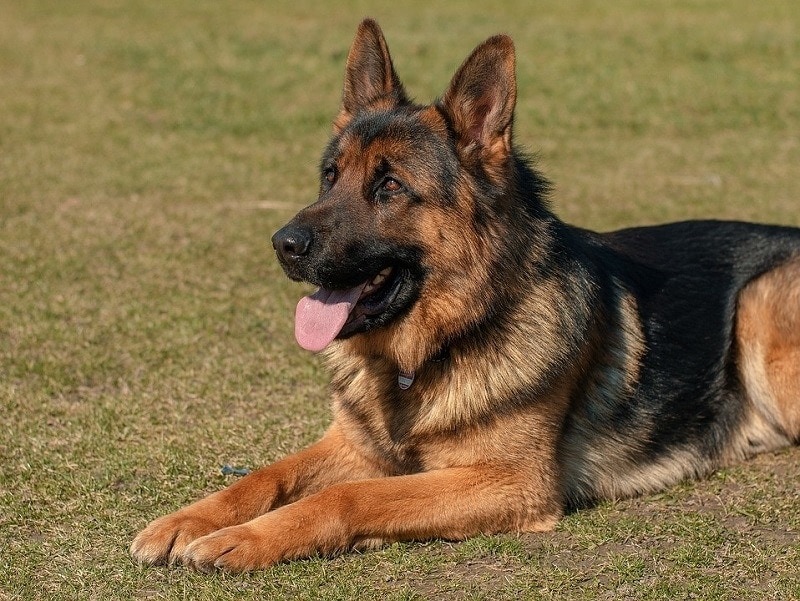
German Shepherds are perennially one of the most popular dog breeds in the world, as their high intelligence, loving nature, and obedient personality make them easy companions to live with.
Their popularity helps drive their price down somewhat, and you can find purebred puppies from established breeders for as little as $500. That price can skyrocket if you want a show-quality dog, however, or if you want one that’s trained to do everything under the sun.
German Shepherd Personality
German Shepherds have razor-sharp intellects, and they’re constantly curious about the world around them. This makes them easy to train, but it also means they require near-constant stimulation, and they can be formidable escape artists if something entices them from beyond their backyard.
They are definitely playful, and they’ll romp around the yard with children or other dogs for hours on end. They can be fiercely protective of their families, but they can also roll around with small children without ever showing an ounce of aggression.
That protectiveness is a big reason that they need to be properly socialized, as they can react poorly to strangers or guests. They’ll need to learn that watching over their families doesn’t entail being aggressive toward others.
These dogs love to have a job to do, so they’ll do well when given complex tasks to perform. They’re not designed for sitting around the house, so you’ll need to provide them with plenty of physical and mental stimulation.
If not given enough exercise, these dogs can turn destructive. If you value your shoes and furniture, it’s a good idea to keep them tuckered out as much as possible.
Training for German Shepherds
These dogs are incredibly obedient, so training them is easy even for the first-time owner. They pick up commands extremely quickly, and they can be taught to do even the most complex tasks if trained consistently.
They live to please their owners, so you shouldn’t get much resistance to your training efforts. They can be stubborn at times, but it’s usually nothing that a firm hand won’t solve.
Like Dobermans, German Shepherds don’t respond well to abuse or punitive training measures. They should be trained using positive reinforcement techniques, so reward the behavior that you want and ignore that which you don’t.
You can train them with treats or just praise, but be careful not to overfeed them. The breed can be prone to obesity, so you don’t want your training efforts to cause health issues down the line.
In addition to consistent training, you should socialize your dog from an early age as well. That means introducing them to new places and people regularly, ensuring that they build the self-confidence necessary to handle novelty without resorting to aggression.
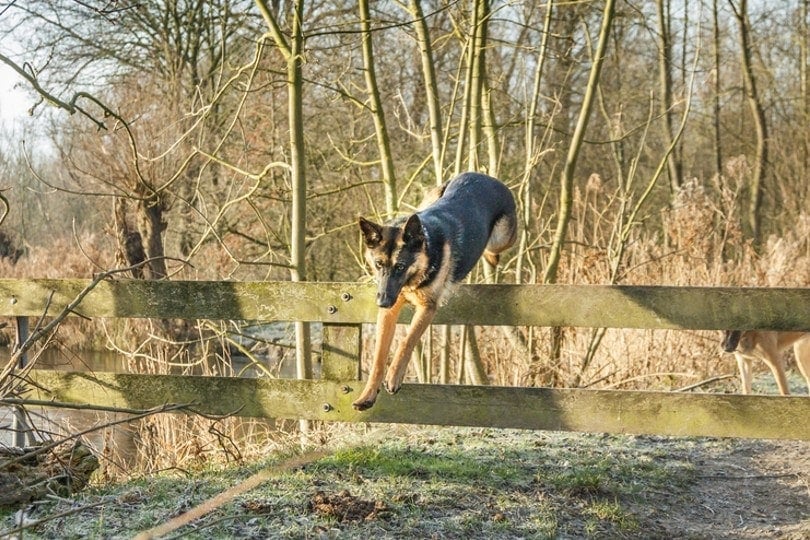
German Shepherd Health and Care
Like Dobermans, German Shepherds need a high-protein diet that will fuel their energetic lifestyle. You should avoid kibbles with cheap fillers like wheat, soy, corn, or animal by-products, as these can lead to weight gain without offering much in the way of nutrition.
They need plenty of exercise, and you should aim for 2 hours per day. You should also offer them mental stimulation; they respond well to obedience work, puzzle toys, and games like hide-and-seek.
German Shepherds also do well in canine competitions, as their intelligence and athleticism make them formidable opponents in any sort of competitive endeavor. These high endeavor German Shepherds do take some work to take care of.
These dogs can shed quite a bit, as they have dense, bushy coats. You’ll need to brush them regularly. Their other grooming needs are quite basic: Brush their teeth daily, trim their nails as needed, and clean out their ears once a week.
German Shepherds have downward-sloping hindquarters that give them a distinct appearance; unfortunately, this often leads to skeletal issues later in life. They can also suffer from conditions like hip dysplasia, degenerative myelopathy, Von Willebrand’s disease, and pancreatic issues.
German Shepherd Suitability
The German Shepherd’s easygoing nature and keen intelligence make them excellent pets for just about anyone. They get along with small children but also enjoy the company of adults, and they do equally well in large households or with single owners.
The breed has tons of energy, so they’re a poor choice for anyone looking to spend the bulk of their time watching TV. They need an active owner or at least one who’s willing to take them to the park and watch them race around for a bit.
The breed is prone to a variety of potentially debilitating health conditions, so you’ll need to be prepared for an equally debilitating vet bill at some point. Most owners would say that these dogs are well worth the cost, however.
Which Should You Choose?
Doberman Pinschers and German Shepherds are remarkably similar dogs, so anyone who’s interested in one of the breeds will likely do equally well with the other. They both make great family dogs, but they’re best-suited for active households in which they’ll be given plenty of attention and exercise.
Dobermans tend to be a bit bigger and have shorter, bristly coats. They shed less and will likely require less medical attention, so if any of those things are important to you, they might be the best choice for your situation.
German Shepherds are incredibly popular for a reason, and many owners swear by them. They’re affectionate, fluffy, and fun-loving, and while they may be an expensive breed in the long run, they’re definitely worth every penny.
At the end of the day, you can’t go wrong with either dog. In fact, given how much exercise these dogs need, you may want to consider getting one of each and letting them exhaust each other in the backyard.
See also:
- Pitbull vs American Bulldog: What’s the Difference?
- Australian Cattle Dog vs Australian Shepherd: What’s the Difference?
Featured Image Credit: (L) Dyrefotografi, Shutterstock | (R) Eudyptula, Shutterstock

